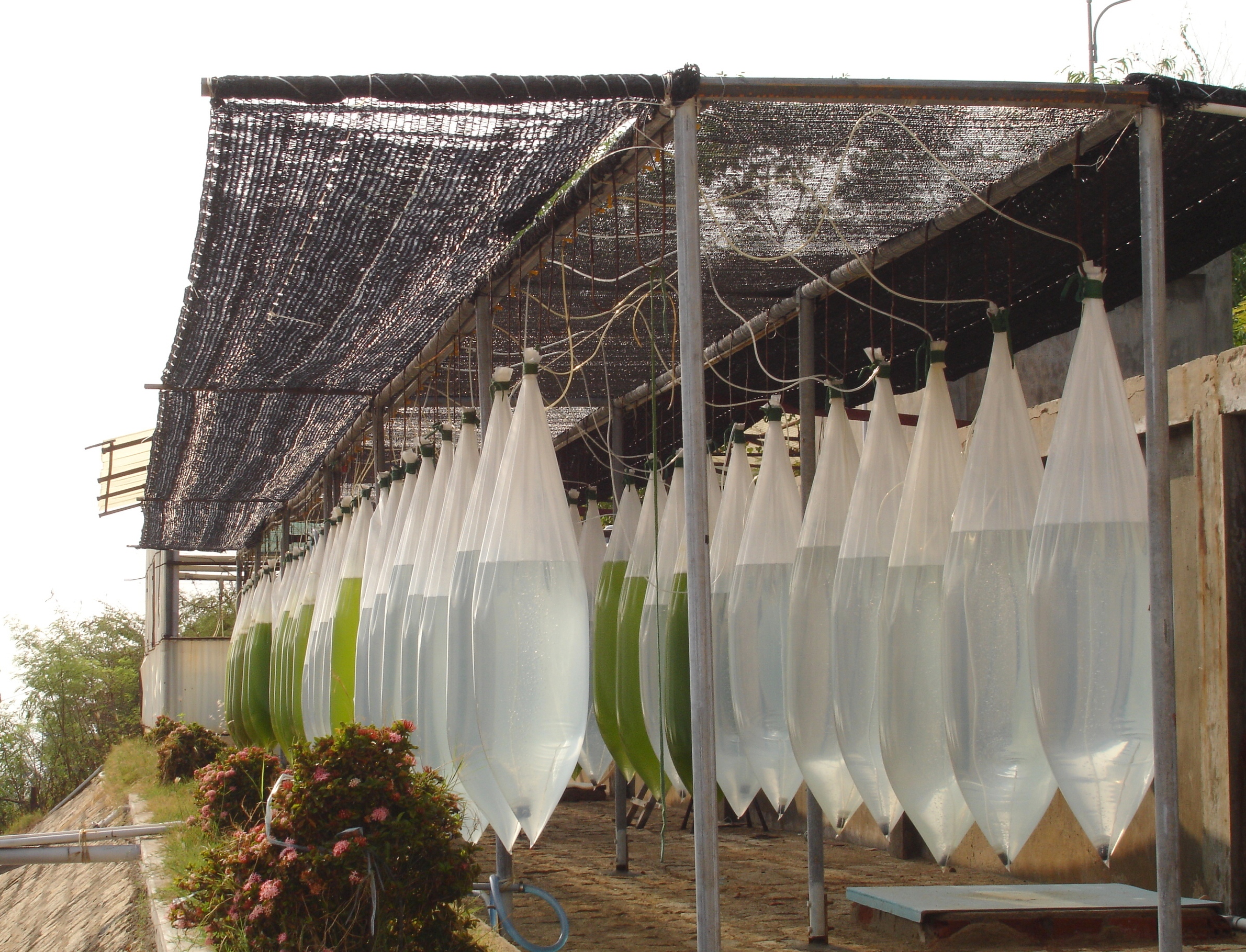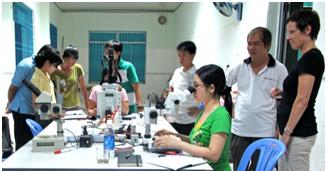INSTITUTE OF AQUACULTURE
| |
Institute of Aquaculture has been the key role in providing the manpower for fisheries and aquaculture sectors in Vietnam. The institute’s responsibility is to educate and train students and researchers in the field of aquaculture, fish pathology and aquatic resources management at graduate and postgraduate levels. The Institute also assists Laos and Cambodia in training their staff in the area of aquaculture. Since establishment, the institute has educated and trained thousands of bachelors, hundreds of masters and PhDs.
|
|
| |
 |
|
| |
The Institute has three departments, including Department of Freshwater Aquaculture, Department of Brackish Aquaculture, and Department of Marine Aquaculture. It has 57 staff with 97 percent obtained their masters and doctoral diploma. Researchers at the Institute study and solve issues raised in the field of fisheries and aquaculture. We are interested in exploring biological processes in aquatic organisms, environmental and resource management. We also employ advanced biotechnological applications in aquaculture of fish, crustaceans, molluscs and seaweeds.
|
|
DEPARTMENTS
Department of Freshwater Aquaculture
| |
The understanding of biological processes is important for management of resources and development of better and more sustainable aquaculture practice. Researchers at the Department are interested in exploring biological mechanism underlining embryo development, bio-physiological processes of the early stage of life cycles of fish, crustacean and mollusks, and reproductive biology of aquatic organisms. We are also study on physiology and preservation of semen and sperms of fish, e.g., sandbass, Barramundi, Psammopercawaigiensis, Latescalcarifer, and grouper, Epinephelus fuscoguttatus that is important for breeding and conservation programmes.
|
|
| |
Algae (Spirulina platensis and Nannochloropsis, etc.) and zooplanton (artemina, copepod, etc.) are inevitable sources of live feeds for larvae. We study on production of micro algae and artemia for larvae rearing. Production of sufficient amount and good quality of live feeds is important to increase viability of the larvae, and thus artificial seed production success. In addition, we are interested in producing algae for functional food for human consumption.
We are also interested in study the expression of genes that are involved in nutrient absorption and energy allocation in fish and crustaceans. There is research on develop molecular and genetic markers applied in breeding programs.
|
|
Department of Brackishwater Aquaculture
 |
The Department has long traditions for seed production and exemplifying sustainable aquaculture practice. We have achievements in propagation and cultivation of fresh water fish species, such as grass carp, Ctenopharyngodon idellus, common carp Cyprinus carpio, silver carp, Hypophthalmichthys molitrix and tilapia, Oreochromis niloticus, and marine finfish, e.g., Barramundi, Lates calcarifer, grouper, Epinephelus fuscoguttatus, red snapper, Lutjanus argentimaculatus, cobia, Rachycentron canadum, and bompano, Trachinotus blochii.
|
|
| |
In addition, we also obtained success in reproduction and cultivation of tiger shrimp, Penaeusmonodon, white leg shrimp, Penaeus vannamei, lobster, Palunirus ornatus, Pacific oystes, Crassostrea gigas and seaweeds (sea grape, Caulerpa lentillifera).
|
|
| |
Vietnam has large areas of fresh water body and long coastline that is great potential to develop aquaculture to contribute to national and world economy. We are interested in study the reproductive biology and seed production of red snapper, rabbit fish, Siganus guttatus, pompano and plate snail, Nerita balteata. There is also research on in producing live feeds to improve viability of fish, crustaceans and mollusks at the larval stages. In addition, we also study nutritional requirements and producing formulated feed for pompano, cobia and spiny lobster. We employ advanced management of fish brood stock and genetic markers in breeding programs.
|
|
| |
The Department has co-operations with extension Agencies to transfer technology in aquaculture to aquaculture communities. Our department alsohas collaborations with several other institutes and universities and aquafeed companies in order to build up protocols for sustainable aquaculture development. These activities give us a competence suitable for work within industry, regulatory agencies, or research and teaching within the field of aquaculture and resource management.
|
|
Department of Marine Aquaculture
| |
Aquaculture has been challenged by disease outbreak and environment pollution due to waste discharge. Our interest is to employ methods for better water quality controls in aquaculture systems. We study on applications of prevention, modern diagnosis technique and treatment for viral and infectious disease. There is research on monitoring, accessing and management of fisheries resources for sustainable development.
|
 |
| |
We have achievement in diagnosis and treatment for MBV (Monodon baculovirus) in tiger shrimp, Penaesus monodon, whitish blood disease in lobster, Palunirus ornatus and bacterial and parasitic pathogen in grass carp, Ctenopharyngodon idellus, common carp, Cyprinus carpio, Barramundi, Lates calcarifer.
The Department has collaborations with other university and institute in order to produce vaccination for Barramundi and other finfish.
|
|
| |
STUDY PROGRAMS
PhD programs (3-4 years)
The Institute of Aquaculture is responsible for the PhD programs within aquaculture as follows.
- Freshwater Aquaculture
- Marine Aquaculture.
- The research is a collaboration between research groups at the Institute and external groups.
Master program (2 years)
The Institute of Aquaculture is offering 2 years Master program in Aquaculture. The program is offered to students with bachelor degrees with relevant background from other universities, technical institutes of colleges.
Bachelor programs (4 years)
The Institute of Aquaculture is offering different 4-year bachelor programs as follows
- Aquaculture
- Aquatic Resources Management
- Fish Pathology
RESEARCH INTERESTS
- Artificial breeding and seed reproduction of cultured species with high economic value
- Production of pellet feeds for mariculture
- Measures for aquatic environmental and pathological management.
|
|
| |
CONTACT INFORMATION
Visiting and Mailing address: Institute of Aquaculture, Floor 3, B1, Nha Trang Campus, 02 Nguyen Dinh Chieu, Nha Trang, Khanh Hoa, Vietnam
Tel: + 84.258.247 1396
Fax: + 84.258.383 1147
Website: /khoanuoi/vi-vn/trangch%E1%BB%A7.aspx
|
|
| |
LEADERSHIP
Director: Mr. Pham Quoc Hung, Assoc. Prof. Dr.
Email: hungpq@ntu.edu.vn
Tel: + 84.258.222 0816
Vice-Director: Mr. Nguyen Tan Sy, PhD.
Email: syngtan@gmail.com
Tel: + 84.258.247 1396
|
|
|